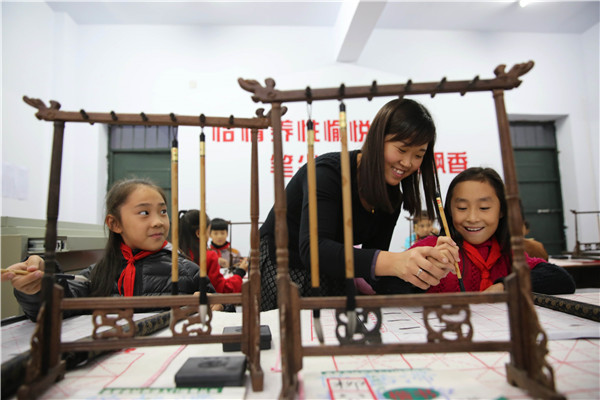As pupils face ever-growing pressure to improve grades, courses offered by private agencies seem like an easy solution but the cost in both time and money is high.
|
Students practice calligraphy in Wuzhi county, Henan province. The course is part of a free-tuition program run by the local government. [Photo/Xinhua] |
Wang Haifeng is pondering whether to register her son, a fifth-grade Beijing primary school pupil, on a math tutorial course. If she does, it would be the fifth course the Beijing resident has signed her 10-year-old child up for.
The other four are English, Chinese classics, basketball and the game of Go. Her son has to attend each class once or twice every week.
“The number is not that large compared with many of my son’s classmates at school, who have seven, eight or even more tutorial courses of different subjects to take outside school.”
The popularity of these seemingly “hot services” is accentuated by the scarcity of places offered by some tutorial agencies.
In November 2016, a report by Metro Express, a newspaper in Zhejiang province about parents waiting outside classrooms of a well-known tutorial agency to obtain a place for their children went viral on WeChat Friend Circle. It triggered heated discussions and retrospection among parents and educators on whether the pursuit of such services is rational or not.
The report said many parents signed their children up for tutorial courses not only to improve the children’s test results over a short period of time, but also with a longer-term view: to get the children prepared for the fierce competition of entrance exams for highly selective junior middle or high schools.
According to educational laws and regulations, pupils in China do not have to take any tests when they finish their primary school studies and rise to junior middle school.
But the principle only applies to students who choose to enter ordinary junior middle schools that are adjacent to the addresses on their hukou, or permanent residence permit.
For those who want to attend prestigious junior middle schools with better facilities and teachers, they have to pass independent recruiting exams, which are organized by the schools and consisting of tests of subjects taught in primary school, including math and English.
Under such circumstances, turning to tutorial agencies that help students improve test scores is almost a must to possibly increase the odds of being admitted.
Follow this news feed: East Asia


